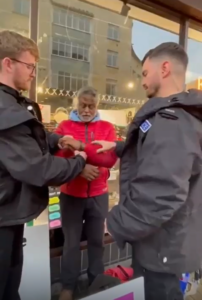- Livia Tossici-Bolt was urged by officers to “move on” after praying OUTSIDE a local “censorship zone” which prohibits prayer within 150m of abortion facilities
- Authorities clamp down on prayer ahead of legislative proposals to prohibit “influencing” and “expressing opinion” near abortion facilities nationwide; parliamentarians warn of “slippery slope” of censorship
BOURNEMOUTH (24 November 2022) – Local woman Livia Tossici-Bolt was praying quietly with a friend in a public space when she was warned by local authorities that their prayer could cause “intimidation, harassment or distress”, and was asked to move away.
With support from ADF UK, Tossici-Bolt has subsequently filed a complaint against the authorities for breaching her freedom to pray on a public street.
“Everyone has the freedom to pray quietly in a public place. I would never dream of doing something that causes intimidation and harassment. We complied with the new rules instituted by the council and didn’t pray within the censorship zone. Yet nevertheless, these prayer-patrol officers tried to intimidate us out of exercising our freedom of thought and of expression – in the form of prayer -which has been a foundational part of our society for generations,” commented Livia Tosici-Bolt.
The warning came as parliamentarians raised concerns in Westminster this week that instituting censorship zones around abortion facilities across the country (in clause 9 of the Public Order Bill) could create a “slippery slope” of increasing censorship in UK legislation.
“If we pass Clause 9, why will other institutions not demand buffer zones around their special case facilities? If we consider that in Clause 9 a buffer zone is defined very broadly as “150 metres from … any access point to any building or site that contains an abortion clinic”, does that not make protests of all sorts at hospitals potentially unlawful? What if you wanted to organise a vigil outside a hospital in which, for example, babies died due to negligence, such as in the maternity services scandal recently? What about a rally against the use of puberty blockers on teenagers? Would that be banned too?” said Baronness Claire Fox of Buckley in an address to the House of Lords on Tuesday.
Penalties for Praying
Tossici-Bolt was with a friend when she was approached and asked to move by two “Community Safety Accredited Officers”, employed by the local council to patrol a demarcated area of approximately 150m circumference outside of an abortion facility to detect activities including praying, crossing oneself, or offering support.
The officers complained that the women were praying close to the edge of the so-called “censorship zone”. They said that they were concerned that their silent prayer would amount to “intimidation and harassment” to staff possibly passing by. The officer also noted concerns about the women’s proximity to a local school. “The children may ask questions,” noted the officer. Tosici-Bolt responded that there “is nothing wrong with asking questions.”
“The principle of so-called “buffer zones” erodes the basic tenets of democracy – that is, in this country, we are allowed to hold different views and beliefs,” commented Lois McLatchie, communications officer for ADF UK.
“We stand firmly against harassment of women. Police forces and local authorities already have a wealth of legislation to prevent and penalise harassment of women in any circumstance, let alone near an abortion facility. New ”censorship zones” go far further than is just or necessary – clamping down on civil liberties that allow volunteers to offer genuine help, or even just to pray, in a public space,” McLatchie continued.
Five local councils that have implemented such “buffer zones” have prohibited prayer, and during legal proceedings, Ealing Council admitted that this included a ban on even silent prayer. Free speech campaigners such as Baroness Claire Fox have raised concerns that this amounts to a “thoughtcrime”.
“In the case of Livia, we see clearly that once you prohibit the expression of a minority viewpoint in one public area, there is no logical stopping point. Livia and her friend were pressured by the authorities for praying on a public street that was not even within the so-called ‘buffer zone’. What’s now to prevent an embassy applying for a buffer zone to end the ‘distressing’ protest of dissidents, or town halls to decide to ban, for example, the rallies of gender-critical feminists in their vicinity, and go on to enforce these bans even beyond the already-vague limits of the law?”, said Jeremiah Igunnubole, Legal Counsel for ADF UK.
Pressure builds against censorial “buffer zones” policies
The complaint against such “prayer patrols” comes as parliament debates a national roll-out of “buffer zones” as seen in Bournemouth. Clause 9 of the Public Order Bill, currently under debate in Westminster, prohibits not only “harassment” outside of abortion facilities but “informing”, “advising”, “influencing”, “persuading” and even “expressing an opinion”.
The censorial provisions drew substantive criticism from members of the House of Lords, including Liberal Democrat Peer Lord Beith, who deemed the clause “the most profound restriction on free speech I have ever seen in any UK legislation.”
Lord Frost equally noted that, “I don’t think it can be right for this Parliament to make it illegal for example to ‘seek to influence’…‘persistently occupy’…or ‘inform or attempt to inform’ …And that is true whether it is in the vicinity of an abortion clinic or anywhere else”.
Former Police Ombudsman Baroness O’Loan was also highly critical of the buffer zone clause in the Bill, saying, “A blanket ban around abortion clinics my Lords would be disproportionate, it would be a denial of the right to the freedom of expression, it is unnecessary and it could even be harmful.”
The Clause has caused great controversy following a statement released from the Parliamentary Under-Secretary of State shortly after MPs voted to include it, admitting that the clause “could not be said to be compliant” with rights protected in the European Convention on Human Rights.


